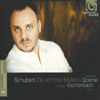Schubert (Die) Schöne Müllerin
It’s slow going as Goerne revisits Die schöne Müllerin for his Schubert series
View record and artist detailsRecord and Artist Details
Composer or Director: Franz Schubert
Genre:
Vocal
Label: Harmonia Mundi
Magazine Review Date: 9/2009
Media Format: CD or Download
Media Runtime: 0
Mastering:
Stereo
DDD
Catalogue Number: HMC90 1995

Tracks:
| Composition | Artist Credit |
|---|---|
| (Die) Schöne Müllerin |
Franz Schubert, Composer
Christoph Eschenbach, Piano Franz Schubert, Composer Matthias Goerne, Baritone |
Author: Richard Wigmore
“It sometimes seems to me as if I did not belong to this world at all.” These oft-quoted words of Schubert’s may be apocryphal. But they could well stand as an epigraph to Matthias Goerne’s new Schöne Müllerin, similar in conception, albeit with countless differences of shading and nuance, to his 2001 Decca recording with Erich Schneider. With his deep, sombre timbre and penchant for slow tempi, Goerne again seems to eye his tragic fate virtually from the outset. As early as the second song, “Wohin”, he establishes the journeyman miller as an intensely melancholy, self-communing dreamer, dangerously mesmerised by the stream, already half in love with easeful death. After a surge of manic, almost hysterical, elation in “Am Feierabend”, he sings “Der Neugierige” as if in a trance. Even the relatively “happy” songs at the cycle’s centre are saturated with a sense of impending doom, sung throughout, as it were, in the minor key.
At the arrival of the macho huntsman in “Der Jäger”, Goerne’s miller erupts in frenzied fury, shading to bitterness and stoical heartbreak in the following “Eifersucht und Stolz”. Most problematic, as in his earlier recording, are the final songs. Goerne’s haunted colourings and hypnotic intensity of line are undeniably compelling. No singer cares more for the beauty of Schubert’s melodies; and the sentient Christoph Eschenbach – a pianist in a different class from Decca’s matter-of-fact Schneider – fully matches him in eloquence and finesse. Some will find these closing songs overwhelming in their desolate pathos. For me, though, Goerne’s ultra-protracted tempi come to seem enervating, even self-regarding.
This is certainly a profoundly considered, deeply felt Schöne Müllerin, freer in expression, more varied in colour than Goerne’s Decca recording. But it remains controversial. Among baritones, Wolfgang Holzmair, Thomas Quasthoff and Fischer-Dieskau (with Moore
in 1961) all catch the wonder and excited anticipation of the earlier songs, and later convey the young miller’s disenchantment and final tragedy without recourse to Goerne’s eccentrically slow tempi.
Discover the world's largest classical music catalogue with Presto Music.

Gramophone Digital Club
- Digital Edition
- Digital Archive
- Reviews Database
- Full website access
From £8.75 / month
Subscribe
Gramophone Full Club
- Print Edition
- Digital Edition
- Digital Archive
- Reviews Database
- Full website access
From £11.00 / month
Subscribe
If you are a library, university or other organisation that would be interested in an institutional subscription to Gramophone please click here for further information.




